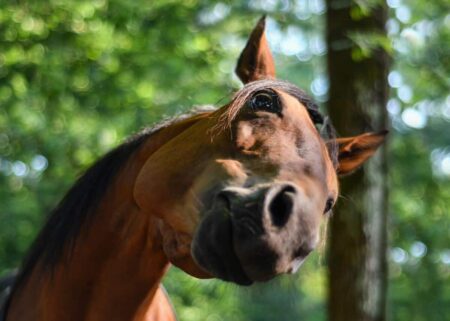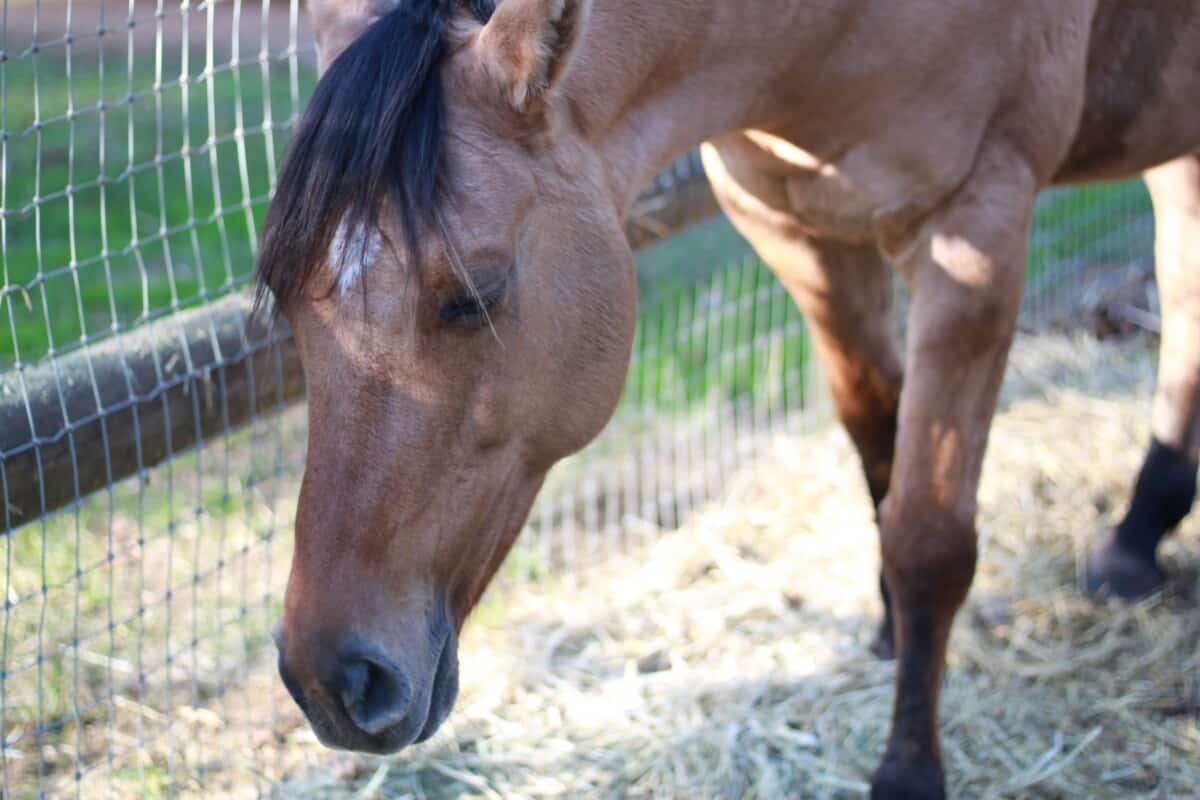
If you have been around horses or even observed them from a distance you may have noticed that they sometimes appear to be sleeping while still on their feet. Odd right? I wasn’t really sure if my horse was actually asleep or not, so I did a bit of research to find out more about the horse’s sleeping habits.
Do horses really sleep standing up? Horses can snooze while standing up but need to lie down in order to achieve deep sleep. It is believed that this ability stems from horses being prey animals and the ability to sleep standing allowed for them to make a quick escape from predator attacks, increasing their chances of survival in the wild.
Understanding a horse’s sleep patterns can be very helpful in understanding its overall behavior and performance. On a scale from 1 to 10, how grouchy are you after a few nights of bad or no sleep? Well, sleep patterns and sleep quality also affect your horse, so let’s dive a bit deeper into this topic.
Why Do Horses Sleep Standing Up?
Back in the day, horses used to be wild animals before they were captured and domesticated by humans for use in wars, for transportation, and in agriculture. For this reason, they still have instincts that would increase their chances of survival in the wild. Their sleeping habits are just one example of this.
Although horses are large, they were still prey animals and had to protect themselves from various predators such as mountain lions and wolves. One of the ways they could do this was by sleeping while standing up. This way they could rest, but still, be able to take off running on a second’s notice if needed. Horses would also select their resting spot carefully by ensuring it had cover, good escape routes and they would direct their heads against the wind to pick up on scents from lurking dangers as quickly as possible.
A horse laying down is a vulnerable horse. This is also why, whenever in packs, it is common for one horse to remain on its feet and alert while others are laying down sleeping. The standing horse is keeping a lookout for potential dangers and this role will typically rotate within the herd to allow everyone to get the rest they need.
How Can Horses Sleep Standing Up?
From a physiological perspective, what allows horses to enter light sleep while standing is something called the stay apparatus. This is a group of ligaments, tendons and muscles that lock major joints in the limbs of the horse, which in turn allows it to relax and keeps it upright while in a sleeping state. Similar to other mammals such as cattle, giraffes and elephants, the horse benefits from this mechanism not only when snoozing, but also when relaxing on its feet.
Do Horses Sleep Standing Up With Eyes Open?
Depending on the depth of their state of sleep, horses may keep their eyes open or partly open. In order to achieve deep sleep though, the eyes need to be closed. Often, when walking around a barn or stable, you will see horses in their boxes standing calmly, with their eyes open or partly closed. They are however probably snoozing.
How Can I Know if a Horse is Sleeping?

There are a few things that will help indicate if your horse is sleeping and how deep a sleep state he is in.
If a horse’s eyes are closed and he is laying down, he is definitely sleeping and is probably in a deep sleep. If the horse is standing with open or partly open eyes, he may or may not be sleeping. If you are not sure, look for these other signs to help decipher this:
- Is the head lowered? When a horse is snoozing, his head will be lowered slightly as the body relaxes.
- Is his lower lip drooping? Another sign of a horse relaxing its body while snoozing is that the upper lip droops downwards.
- Is he leaning on one hind leg while the other is cocked and resting on the tip of the hoof? Horses can distribute their weight on three legs at a time and usually rest one of the hind legs. If a horse is doing this he is resting, and if combined with the other signals above, probably sleeping.
How Many Hours of Sleep Do Horses Need?
So, horses can snooze standing up, however, in order to achieve deep sleep (REM), they need to lie down and research suggests that REM sleep occurs primarily when the horse is stretched out on his side. It is important for horses to get enough deep sleep to maintain their energy levels and research has shown that it also impacts their memory and ability to learn. However, they need vastly less REM sleep than humans. Typically, an adult horse will sleep about three hours laying down and this time will usually be broken into shorter 15-20-minute intervals that occur throughout both the day and night.
How Does Lack of Sleep Impact a Horse?
Sleep deprivation in horses is an under-studied area and much more research is needed to fully understand how lack of sleep (in particular REM sleep) affects a horse and what impacts a horse’s sleep quality.
A horse that does not lie down to sleep may experience collapse, which means it falls down as it enters REM sleep in a standing position. This often leads to injuries to the legs and head from the impact of falling.
How Can I Help My Horse Sleep Better?
Again, more research is needed in this area, but there are a few elements to consider that are commonly known to have an impact on a horse’s sleep.
The Environment
Due to its primal instincts of guarding itself against external dangers, it is critical that a horse feels safe and relaxed in the environment where he spends the night. If a horse is anxious in its environment, this will discourage it from laying down (a vulnerable position for a horse) and getting the REM sleep it needs. This is important to keep in mind whenever moving a horse, whether it is temporary or permanent.
Physical comfort
A horse in pain will often avoid laying down as the process of getting down and up again may cause it additional discomfort. It is therefore important to observe a horse and look for cues, both physical and behavioral, that may indicate injuries or wounds.
Sufficient space
If a horse does not have enough space to lay down, it won’t lay down. Pretty obvious, but still an issue in many stables around the world. Usually, a box stalls for horses should be 12 feet by 12 feet (3.6 by 3.6 meters), but a larger horse would need a slightly larger space and a pony will be fine with slightly less.
Related questions
Why is it bad for a horse to lay down? Horses are heavy mammals and laying down puts a lot of pressure on their nerves which can become damaged if they lay down for longer periods of time. In addition, the pressure can cut off blood flow to their limbs making it very difficult for them to get back up on their feet.
This article is accurate and true to the best of the author’s knowledge. It is not meant to substitute diagnosis, prognosis, treatment or any type of medical advice for humans or horses. Animals exhibiting signs and symptoms of distress should be seen by a veterinarian immediately.


